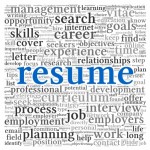
Widgetized Section
Go to Admin » Appearance » Widgets » and move Gabfire Widget: Social into that MastheadOverlay zone
The Perfect Resume – Don’t Make These Mistakes
Ten resume mistakes you don’t want to make
 There are four basic steps to obtaining the perfect job: write your resume; send your resume to prospective employers; go on job interviews; wait for job offers. Each step is crucial and cannot be skipped. With that in mind, you can see that writing your resume is the catalyst that gets the whole ball rolling. While a resume will not get you a job in and of itself, a great resume will get you the interviews you need in order to get the job.
There are four basic steps to obtaining the perfect job: write your resume; send your resume to prospective employers; go on job interviews; wait for job offers. Each step is crucial and cannot be skipped. With that in mind, you can see that writing your resume is the catalyst that gets the whole ball rolling. While a resume will not get you a job in and of itself, a great resume will get you the interviews you need in order to get the job.
There are many characteristics that define a great resume. Perhaps a better place to start is by illustrating some common mistakes — things NOT to do with your resume. Remember: a mediocre resume may mean no interviews or interviews only for jobs that don’t meet your expectations. With that in mind, I’ve created a “Top Ten List of Resume Don’ts.”
- Do not lie! Creativity is good, but dishonesty is not.This is extremely important. Even the smallest lies can come back to haunt you. For example, one acquaintance of mine stated on his resume that he earned a grade point average of 3.5 in college. The prospective employer checked with the school and found out that his GPA was actually 3.48. He was dropped from consideration for the job and was told that this was the reason. Now, obviously not all employers are going to check that kind of information, and, if they do, most aren’t going to drop you if you are .02 points off. But the possibility is always there.
- Do not give personal information! Stick to the facts that are relevant to this job search.Your religious affiliation, political beliefs, height, weight, and the fact that you like to play volleyball are not important in most job searches. There are some exceptions to this, of course. One exception might be if you are looking for a job in the political arena –obviously, your political affiliation would then be important. But for your standard, everyday job, it’s best to leave these things off.
- Don’t forget to include a “Summary of Qualifications” at the top of your resume.The Summary of Qualifications allows you to put your most important skills and accomplishments right up front. Since most employers scan resumes in about 20 seconds to decide whether they want to consider the person for the job, it is crucial to put the most important information first; otherwise the employer might miss it.
- Do not write exclusively in paragraph form or exclusively with bulleted lists. Use both!By writing your resume with some paragraphs and some bullets, you will create a format that is easy for the reader to read. Be consistent though. I like to put a short paragraph under each job listing job responsibilities, and then put accomplishments in a bulleted list under the paragraph. Then if the reader only wants to see accomplishments, they’ll know to look at the bullets. Do the same thing for every job.
- Do not write about things that you do not want to do again! Write about the things that you WANT to do in your next job.A resume needs to show employers what you are capable of doing for them. If there is an aspect of your current or past job that you hated, don’t highlight it on your resume or potential employers will think that you will love to do that same task for them.
- Do not have any misspellings, grammatical errors or other mistakes!Would you want to hire someone who can’t even take the time to use their spell checker or who doesn’t know the difference between “there,” “their,” and “they’re?” Enough said.
- Do not use “vague” terminology! Use ACTION words instead.Action words show that you are not passive. They show the potential employer that you are a take-charge kind of person who can get the job done. Use words such as “designed,” “implemented,” “increased,” “improved,” etc.
- Do not put a “Job Objective” that cannot be supported by your resume.Even if you are changing careers, your job objective should be represented in your resume. For example, if you are a teacher wanting to transition into a sales career and you’ve never had a sales job, you can still support your objective by highlighting your people skills, presentation skills, and persuasion skills. Those skills are essential for a salesperson, but most teachers also have those skills as well. Show the potential employer that even though you don’t have the exact experience they want, your experience is still relevant.
- Do not write a job description. Write about your ACHIEVEMENTS instead.A potential employer doesn’t want to know about every detail of your job. They want to know how you took your job responsibilities and improved upon them or improved your company. In other words, don’t just say that you were responsible for tracking inventory. Say that your inventory tracking system saved the company over $10,000 last year by reducing excessive orders.
- Do not be afraid to get help if resume writing is not your strongest skill!There are two kinds of resume writers. One kind, which you commonly find at print shops, simply types up your resume for you. The other kind takes a professional approach by using an in-depth interview process to determine your strengths and weaknesses. Professional resume writers can effectively apply your skill set to a new position and write a resume that will knock the socks off your potential employer. While the cost for the services of a professional resume writer is greater, the results often mean a better job with better pay. If you are looking for a professional to help you with your resume, insist upon hiring a Certified Professional Resume Writer (CPRW).







You must be logged in to post a comment Login